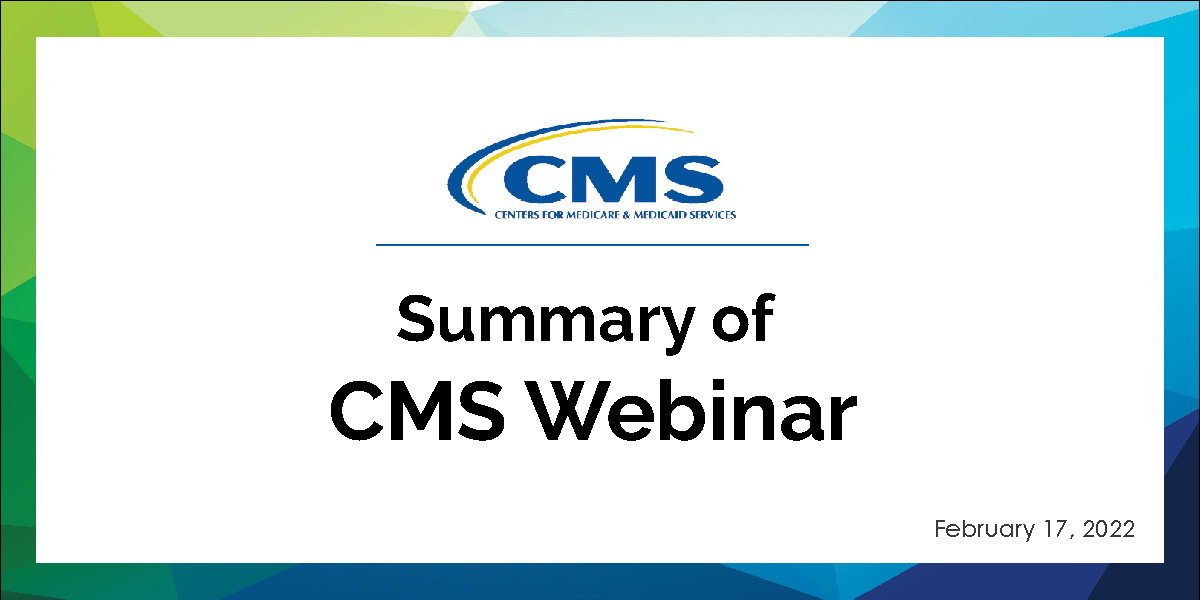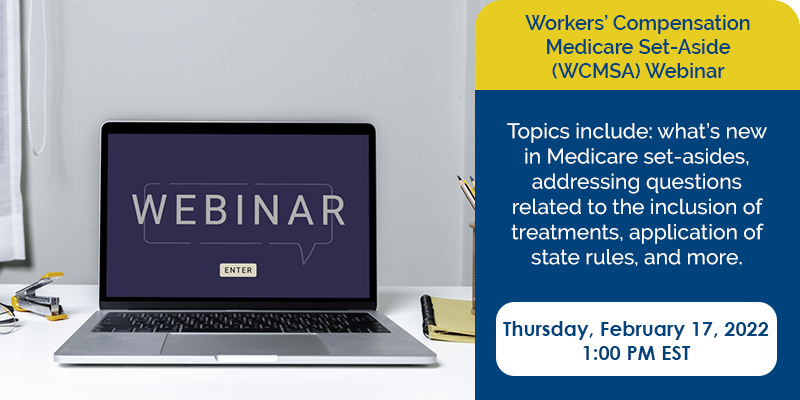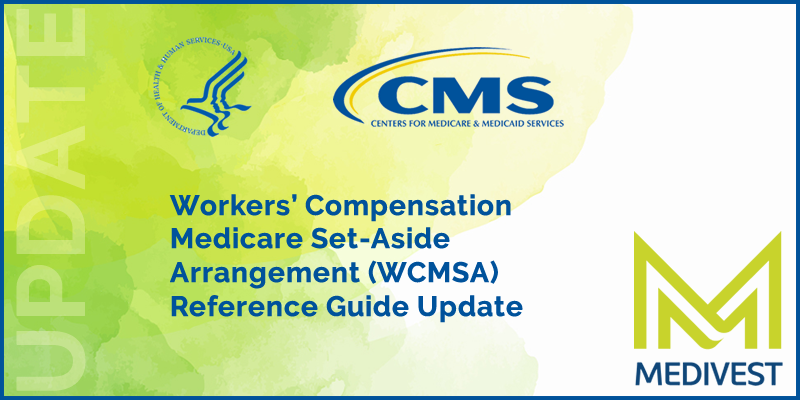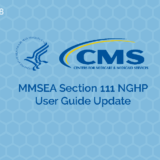The California Applicant Attorneys' Association's (CAAA) 2023 Winter Convention is one of California's premier workers' compensation conventions.
The Medivest Blog
Medivest will be exhibiting at the Arizona Self-Insurers Association ("ASIA") 2022 Annual Conference. This year's theme will be "Our Responsibilities in the Workers' Compensation Arena: A Caring Approach."
The 2022 NCPRIMA Educational Conference attracts public entity Risk Managers, Safety Officers, HR Personnel and others interested in risk management. There is something for everyone.
WCI sponsors the annual Workers’ Compensation Educational Conference and brings together workers’ compensation professionals from across the country. It is the nation’s largest work comp conference and the programming, networking, exhibit hall, and entertainment cannot be matched.
On February 17, Centers for Medicare & Medicaid Services (CMS) held a webinar concerning Workers’ Compensation Medicare Set-Aside (WCMSA) and updates from Section 4.3 of the New WCMSA Reference Guide. John Jenkins, Health Insurance Specialist for CMS, and Contracting Officer’s Representative (COR) hosted the presentation and addressed a variety of questions on the topics.
Note: CMS opened the call with a disclaimer indicating that if there are any discrepancies between what is said on the call and what is written in the Workers’ Compensation Medicare Set-Aside Arrangement Reference Guide (WCMSA Reference Guide or Reference Guide), what is written in the Reference Guide will control.
Treatments
When the Injured Worker (IW), due to comorbidities, is not medically cleared to have a recommended surgery CMS still wants the surgery to be included in the Medicare Set-Aside (MSA). It cannot assume the IW will not be able to meet the medical clearance requirement in the future.
No Treatment Necessary
-
According to Jenkins, if there is a reasonable expectation that there is or will be future treatment for an ongoing medical condition, the Workers’ Compensation Review Contractor (WCRC) has a reasonable expectation that future care should be projected. If a specialist opines that care has concluded, the WCRC feels that it is extremely rare that an individual has only one provider, and there may be other providers including a primary treating physician that would recommend future care. If the individual truly does not need future care beyond a settlement and this is documented, the file should not rise to the level that requires submission. *
Medivest commentary: While not specifically mentioned on the call, Section 4.2 of the Reference Guide lists three requirements that should be met for this no future treatment necessary to take effect as an indication that Medicare’s future interests in a settlement are protected:
“4.2 Indications That Medicare’s Interests are Protected
Submitting a WCMSA proposed amount for review is never required. But WC claimants must always protect Medicare’s interests. A WCMSA is not necessary under the following conditions because when all three are true, they indicate that Medicare’s interests are already protected:
-
-
-
-
The facts of the case demonstrate that the injured individual is only being compensated for past medical expenses (i.e., for services furnished prior to the settlement);
-
There is no evidence that the individual is attempting to maximize the other aspects of the settlement (e.g., the lost wages and disability portions of the settlement) to Medicare’s detriment; and
-
The individual’s treating physicians conclude (in writing) that to a reasonable degree of medical certainty the individual will no longer require any Medicare-covered treatments related to the WC injury.”
-
-
-
Denial / State Specific / Hearings on the Merit
-
CMS recognizes there is such a thing as a legal denial. Jenkins emphasized that CMS standards say there must be some written response from a court of competent jurisdiction or associated board with authority under the law, pursuant to a disputed hearing on the merits. CMS will not decide whether a specific medical condition is or is not causally related to the compensated claim or whether it is or is not catastrophic if a statute limits WC benefits after a set time for catastrophic injuries. If you submit an unfunded “Zero MSA” for approval, CMS and its WCRC expects that such legal support will be included as documentation for the same. Any documentation must be signed by the legal authority.
Regarding a Medical Item, Service, or Expense Recommended by the Treating Physician but Denied by an Independent Medical Review (IMR)
-
It depends on whether an alternative treatment plan is provided. In California, the initial IMR denial is only good for a period of one year and does mean that the denial won’t be overturned on appeal. CMS’s position is if a submitter is going to send in a package and has an item, service, or a prescription drug that the IMR states does not meet the requirements of appropriate treatment, then the item, service, or expense will not be considered unwarranted by the WCRC unless an alternative treatment is provided. If there is no alternative item, service, or expense provided by the treating physician after any such denial, CMS will default to what the treating physician originally recommended.
Medivest commentary: This discussion addressed several areas discussed in the Reference Guide under Section 9.4.5 Medical Review Guidelines specifically listed in its subsection titled State-Specific Statutes, with the main points being listed below for additional clarification:
“A submitter requesting that CMS review the applicability of a state WC statute must include a copy of the statute with the submission and indicate to which section the topic in the submission the statute applies.
Submitters requesting alteration to pricing based upon state-legislated time limits must be able to show by finding from a court of competent jurisdiction, or appropriate state entity as assigned by law, that the specific WCMSA proposal does not meet the state’s list of exemptions to the legislative mandate. For those states where treatment is varied by some type of state-authorized utilization review board, the submitter shall include the alternative treatment plan showing what treatment has replaced the treatment in question from the beneficiary’s treating physician for those items deemed unnecessary by the utilization review board. Failure to include these items initially will result in pricing at the full life expectancy of the beneficiary or the original value of treatment without regard to the state utilization review board recommendation.
Note: Failure to include the required documentation at the time of original submission will not constitute a reason for the request of a re-review.”
Regarding RX Drugs
-
CMS is open to input from the MSP compliance community regarding improvements that might be made in the future regarding dispensing fees and the lowest-priced accepted national drug code at below average market rate.
Amended Review Process
-
CMS did not answer the question posed regarding approved cases that are over 72 months old and did not settle and whether the original MSA approval should be funded for approved cases.
Regarding Annual Attestation
-
Jenkins says CMS places a flag in their system related to body parts and treatment as a result of the CMS submission. That flag will not be removed from the system until the individual provides the attestation as per CMS guidelines.
Regarding Data Sharing with Part D Prescription Drug Plans (PDPs)
-
CMS is not currently sharing all data with Part D plans because those part D plans have not specifically requested it.
Regarding Non-CMS Approved MSAs
-
CMS indicated it had received a lot of questions regarding non-submit MSAs, so that was the driving force behind the inclusion of Section 4.3 in the recently updated WCMSA Reference Guide.
-
Jenkins indicated that CMS’s position with under-threshold WC settlements is that they never would have seen them. He indicated that CMS will issue additional clarification on how to handle those cases in the future.
Medivest commentary: Presumably to add clarification to Section 8.1 entitled Review Thresholds that already provides the two specific examples listed below to illustrate CMS expectations when a WC settlement does not meet Workload Review Threshold:
“Example 1: A recent retiree aged 67 and eligible for Medicare benefits under Parts A, B, and D files a WC claim against their former employer for the back injury sustained shortly before retirement that requires future medical care. The claim is offered settlement for a total of $17,000.00. However, this retiree will require the use of an anti-inflammatory drug for the balance of their life. The settling parties must consider CMS’ future interests even though the case would not be eligible for review. Failure to do so could leave settling parties subject to future recoveries for payments related to the injury up to the total value of the settlement ($17,000.00).
Example 2: A 47-year-old steelworker breaks their ankle in such a manner that leaves the individual permanently disabled. As a result, the worker should become eligible for Medicare benefits in the next 30 months based upon eligibility for Social Security Disability benefits. The steelworker is offered a total settlement of $225,000.00, inclusive of future care. Again, there is a likely need for no less than pain management for this future beneficiary. The case would be ineligible for review under the non-CMS-beneficiary standard requiring a case total settlement to be greater than $250,000.00 for review. Not establishing some plan for future care places settling parties at risk for recovery from care related to the WC injury up to the full value of the Settlement.”
-
With respect to non-approved products, CMS is still putting a marker in their system indicating there is a MSA. The marker allows CMS to avoid making payment.
Medivest commentary: What was not discussed was how WC settlements compensating for future medicals but not submitted for approval to CMS (such as Evidence-Based Medicine MSAs or other non-submit WCMSAs) that are reported by Responsible Reporting Entities (RREs) for self-insured employers or WC carriers under Section 111 Mandatory Insurance Reporting will also be flagged for medical denials. RREs report the ICD diagnosis codes being compensated in a settlement at the time of their electronic Section 111 submission of data including the total settlement amount. Because an approved WCMSA amount is not listed for non-submitted WCMSAs, the default in the Common Working File (CWF) for the WCMSA amount is the settlement amount. Therefore, it seems highly likely that CMS will become more and more efficient in setting the system flags to deny future payments of medicals that correspond to compensated ICD codes deemed by RREs to be associated with a WC settlement. While the remedy of a denied medical is an appeal, if the goal is to not have an injured worker experience a future Medicare medical denial, CMS seems to suggest that the best way to address this issue would be to submit those WC settlements that meet workload review thresholds.
-
The non-CMS approved products do not allow CMS to put a marker in the system and block payment. Until recently, no one provided CMS with that documentation.
Medivest commentary: This statement seemed to contradict the prior statement. The theory initially described was that only submitted WCMSAs are flagged for medical denials to help ensure that CMS complies with the MSP by not paying for medicals when the items, services, or expenses for those specific ICD codes were compensated by the WC settlement. There was no discussion during this webinar on the interplay between Section 111 data and the data obtained via the WCMSA submission process. We hope that CMS will clarify this issue moving forward.
-
There is the possibility the beneficiary will have to expend some of their funds outside of the MSA in a non-approved product situation – it was stated CMS was allowed to deny medicals up to the entire net settlement (allowing for a deduction for procurement costs to be consistent with existing MSP regulations).
-
CMS does not recognize the use of structured settlements for non-submitted MSA products. The individual must demonstrate they have exhausted the full value. CMS will only consider them as a lump sum settlement. CMS will not make payment until the full MSA amount has been exhausted even if they are notified the funding of the MSA was via structure.
-
The WCMSA does not demonstrate post-settlement compliance. The WCMSA is strictly an agreement between CMS and the CMS beneficiary about what dollar value/time, CMS will return as a primary payor if they can show the funds were used correctly. This is an agreement between CMS and the beneficiary only.
-
CMS will stick to the release date of Jan 11th, 2022, regarding how it handles the use of non-CMS approved products.
-
“If a non-approved product is priced correctly, Medicare is never going to see a bill.”
Medivest commentary: This was possibly the most important statement made by Jenkins. He is admitting the reality that there certainly can be reasonably priced non-submit MSAs that do exactly what they were intended to do. If the non-submit MSA accurately reflects the Medicare beneficiary’s injury related Medicare covered medicals and is exhausted exclusively for those purposes, then clearly Medicare’s interests have been protected because Medicare will not be prematurely (or ever) billed for those medicals.
Medivest will continue to monitor changes occurring at CMS and will keep its readers up to date when such changes are announced. For questions, feel free to reach out to the Medivest representative in your area by clicking here or call us direct at 877.725.2467. For any specific questions regarding MSAs of any type, click here.
On Thursday, February 17 at 1 pm EST, Centers for Medicare & Medicaid Services (CMS) will host a webinar regarding Workers’ Compensation Medicare Set-Aside (WCMSA). The full notice can be read below:
CMS will be hosting a webinar to discuss a variety of WCMSA topics, including a summary of what’s new in Medicare set-asides, and addressing questions related to the inclusion of treatments, application of state rules, re-reviews/amended reviews and more. The webinar format will be opening remarks and a presentation by CMS followed by a live question and answer session with representatives from CMS.
Date: Thursday, February 17, 2022
Time: 1:00 PM ET
Webinar URL: https://www.mymeetings.com/nc/join.php?i=PWXW2628369&p=6930242&t=c
and
Conference Dial-In: 800-779-1251
Conference Passcode: 6930242
Please note that for this webinar you will need to access the webinar link and dial in using the information above to access the visual and audio portion of the presentation. Due to the number of participants please dial in at least 15 minutes prior to the start of the presentation.
Additional information about recent updates from CMS about WCMSAs can be found here. If you have questions on how topics discussed in this webinar may affect your clients, please contact Medivest here or call us at 877.725.2467.
The North Carolina Bar Association will be hosting their annual Workers' Compensation Section Program from February 3rd to the 4th. This year attendees will explore the interplay between state and federal claims, learn how to better serve your clients suffering from chronic pain, and hear about the most common ethical dilemmas during mediations over the past year.
The Centers for Medicare & Medicaid Services (CMS) released a revised Workers’ Compensation Medicare Set-Aside Arrangement (WCMSA) Reference Guide (“Reference Guide”) Version 3.5 on January 10, 2022. This Reference Guide replaces Version 3.4 which was released on October 4, 2021. When comparing the two Reference Guides, a new section 4.3 and new language has been added. Below indicates the new section and language added in the (WCMSA) Reference Guide Version 3.5.
To download the new WCMSA Reference Guide v3.5 Click Here.
CMS’s Version 3.5 Reference Guide, Section 1.1 includes the following changes:
Clarification has been provided regarding the use of non-CMS-approved products to address future medical care (Section 4.3).
Section 4.3 The Use of Non-CMS-Approved Products to Address Future Medical Care
A number of industry products exist with the intent of indemnifying insurance carriers and CMS beneficiaries against future recovery for conditional payments made by CMS for settled injuries. Although not inclusive of all products covered under this section, these products are most commonly termed “evidence-based” or “non-submit.” 42 C.F.R. 411.46 specifically allows CMS to deny payment for treatment of work-related conditions if a settlement does not adequately protect the Medicare program’s interest. Unless a proposed amount is submitted, reviewed, and approved using the process described in this reference guide prior to settlement, CMS cannot be certain that the Medicare program’s interests are adequately protected. As such, CMS treats the use of non-CMS-approved products as a potential attempt to shift financial burden by improperly giving reasonable recognition to both medical expenses and income replacement.
As a matter of policy and practice, CMS will deny payment for medical services related to the WC injuries or illness requiring attestation of appropriate exhaustion equal to the total settlement less procurement costs before CMS will resume primary payment obligation for settled injuries or illnesses. This will result in the claimant needing to demonstrate complete exhaustion of the net settlement amount, rather than a CMS-approved WCMSA amount.
Keep in mind the WCMSA Reference Guide states:
There are no statutory or regulatory provisions requiring that you submit a WCMSA amount proposal to CMS for review. If you choose to use CMS’ WCMSA review process, the Agency requests that you comply with CMS’ established policies and procedures.
Take Aways
- While CMS added Section 4.3, this language is not entirely new or at least not entirely unexpected. Similar currently existing Reference Guide language has for years included warnings about what could happen if parties failed to adequately consider Medicare’s future interests in WC settlements. For example, language from previous Reference Guide versions indicated in Section 8.0 that even for examples where a settlement did not meet CMS workload review thresholds “The settling parties must consider CMS’ future interests even though the case would not be eligible for review. Failure to do so could leave settling parties subject to future recoveries for payments related to the injury up to the total value of the settlement” (Example 1) and “Not establishing some plan for future care places the settling parties at risk for recovery from care related to the WC injury up to the full value of the settlement” (Example 2).
- Also in prior versions of the Reference Guide in Section 4.1.4, CMS has warned of its ability and intention to deny injury-related medical services when it said that “If Medicare’s interests were not reasonably considered, Medicare will refuse to pay for services related to the WC injury (and otherwise reimbursable by Medicare) until such expenses have exhausted the entire dollar amount of the entire WC settlement. Medicare may also assert a recovery claim, if appropriate.”
- On a positive note, CMS has now clarified in the new language in Section 4.3 that it will allow for a procurement cost reduction when there is a denial of service when there was no approved WCMSA submission. The new language clearly explains that the denial of service amount will not exceed the gross settlement minus procurement costs. This is more reasonable than denying services up to the entire amount of the settlement as it had previously listed or perhaps denying services up to double the amount of services. The double damages concept has been sometimes misstated in industry circles. (In court cases, even double damages claims have first determined the recovery damages by determining the conditional payment amount after applying a procurement cost reduction and then doubling that amount). The new language actually helps with this issue.
- However, perhaps even more troubling is whether funds earmarked to help protect Medicare’s future interests as WCMSA funds are actually used for the intended purpose. According to the National Council on Compensation Insurance, Inc. (NCCI) 2018 research brief updating its 2014 survey on WCMSAs, approximately ninety-eight percent (98%) of the Workers’ Compensation cases settled with the injured worker choosing to self-administer their MSA funds. This 2018 NCCI update published research brief included a sample of over 11,500 WC settlements between 2010 and 2015.
- Perhaps to address this gap between what is said will be done (i.e. WCMSA allocation reports) and what actually is done (the administration of settlement dollars to pay for injury-related medical items, services, and expenses including prescription drug expenses, CMS already has the following language recommending professional administration in its Reference Guide in Section 17:
“CMS highly recommends professional administration where a claimant is taking controlled substances that CMS determines are “frequently abused drugs” according to CMS’ Part D Drug Utilization Review (DUR) policy. That policy and supporting information are available on the web at https://cms.gov/Medicare/Prescription-Drug- Coverage/PrescriptionDrugCovContra/RxUtilization.html.
Claimants may also administer their own WCMSAs, if State law allows. Claimants should submit annual self-attestations, just as a professional administrator would. This arrangement is subject to the same rules and reporting requirements as any other WCMSA. See Section 17.5 for more on this annual attestation. Although beneficiaries may act as their own administrators, it is highly recommended that settlement recipients consider the use of a professional administrator for their funds.”
- Perhaps CMS felt that its existing high recommendation language for professional administration was sufficient to encourage settling parties to avoid pitfalls of incompetent administration of WCMSAs. But has CMS or any other entity ever done research to see what percentage of self-administered MSA funds were properly and fully exhausted before any injury-related medical bills were submitted to Medicare? If a non-submit WCMSA comes in at 80% of the CMS methodology submitted and approved WCMSA (80% because it follows an evidence-based drug tapering program guideline often seen in a state-based Workers’ Compensation medical protocol like the MTUS in California for example) but the WCMSA funds are professionally administered, wouldn’t that seem to protect Medicare’s real-world interests rather than a CMS submitted and approved WCMSA allocation report but self-administered by an injured claimant?
Stay Up To Date
Count on Medivest to help you navigate your risk tolerance in light of the new CMS WCMSA Reference Guide language and see if we can’t find the right balance to reasonably protect Medicare’s interests in your settlement. Medivest will continue to monitor changes occurring at CMS and will keep its readers up to date when such changes are announced. For questions regarding these updates, please reach out to a Medivest representative in your area by clicking here or call us direct at 877.725.2467.
Medivest will be exhibiting at the California Applicants’ Attorneys Association’s Winter Convention with the theme Back in the Saddle Again. The convention will be held at the Westin Mission Hills Resort from January 20th through 23rd.
The Centers for Medicare & Medicaid Services (CMS) released a revised Workers’ Compensation Medicare Set-Aside Arrangement (WCMSA) Reference Guide (“Reference Guide”) Version 3.4 on October 4, 2021. This Reference Guide replaces Version 3.3 which was released on April 19, 2021. There are a few notable changes when comparing the two Reference Guides. The yellow highlights below indicate the updated changes provided in Reference Guide Version 3.4.
CMS’s Version 3.4 Reference Guide, Section 1.1 includes the following changes:
To help ensure that funding information is provided for the WCMSA amount as part of a settlement agreement, clarification language has been added to several conditional letters (see Section 10.5 and the Approval and Development sample letters in Appendix 5).
To download the new WCMSA Reference Guide v3.4 Click Here.
☑ Section 10.5 wording change is as follows in yellow highlight:
“The parties can proceed with the settlement of the medical expenses portion of a WC claim before CMS actually reviews the proposed WCMSA and determines an amount that adequately protects Medicare’s interests. However, approval of the WCMSA is not effective until a copy of the final executed WC settlement agreement, which must include the funding information for the WCMSA amount, is received by CMS.”
☑ A similar word change was included in the Approval and Development sample letters in Appendix 5 of the Reference Guide to remind submitters that the method of funding is now required to be listed in the WCMSA submission.
☑ The approval letter to be included with the WCMSA submission to CMS should now include the language listed in the version appearing in Appendix 5 with the following statement in bold below:
“Approval of this WCMSA amount is not effective until the Centers for Medicare & Medicaid Services (CMS) receive a copy of the final executed workers’ compensation settlement agreement, which must include the funding information for this WCMSA amount.”
☑ Lastly, in Section 17.7 the WCMSA Reference guide updated references from MyMedicare.gov to Medicare.gov.
Medivest will continue to monitor changes occurring at CMS and will keep its readers up to date when such changes are announced. For questions, feel free to reach out to the Medivest representative in your area by clicking here or call us direct at 877.725.2467. For any specific questions regarding MSAs of any type, click here.









